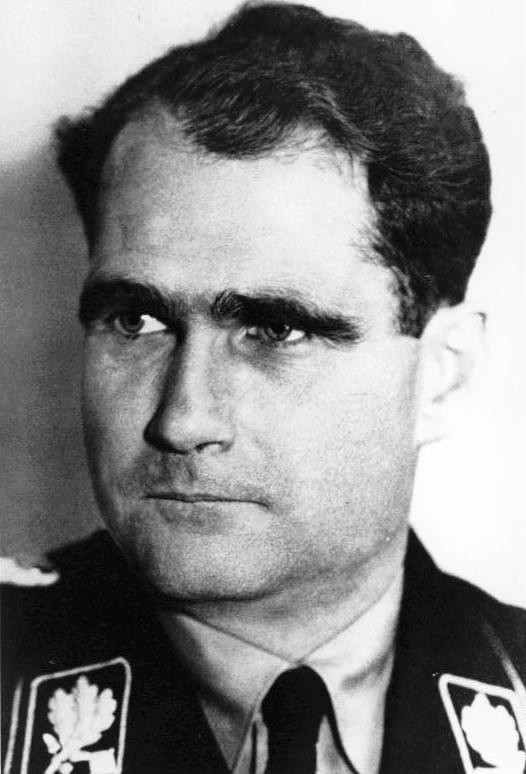Rudolf Walter Richard Hess was a German politician, and a leading member of the Nazi Party of Germany. Appointed Deputy Führer to Adolf Hitler in 1933, he served in this position until 1941, when he flew solo to Scotland in an attempt to negotiate peace with the United Kingdom during World War II. He was taken prisoner and eventually convicted of crimes against peace, serving a life sentence until his suicide.
Hess enlisted as an infantryman at the outbreak of World War I. He was wounded several times over the course of the war and was awarded the Iron Cross, 2nd class, in 1915. Shortly before the war ended, Hess enrolled to train as an aviator, but he saw no action in this role. He left the armed forces in December 1918 with the rank of Leutnant der Reserve.
In 1919, Hess enrolled in the University of Munich, where he studied geopolitics under Karl Haushofer, a proponent of the concept of Lebensraum , which later became one of the pillars of Nazi ideology. Hess joined the NSDAP on 1 July 1920, and was at Hitler's side on 8 November 1923 for the Beer Hall Putsch, a failed Nazi attempt to seize control of the government of Bavaria. Whilst serving time in jail for this attempted coup, Hess assisted Hitler with Mein Kampf, which later became a foundation of the political platform of the NSDAP.
After the Nazi seizure of power in 1933, Hess was appointed Deputy Führer of the NSDAP and shortly received a post in Hitler's cabinet as Minister without Portfolio. He was also appointed in 1938 to the Cabinet Council, and in 1939 to the Council of Ministers for Defense of the Reich. When Hitler decreed in 1939 that Hermann Göring was his official successor, Hess was named as the next in line. In addition to appearing on Hitler's behalf at speaking engagements and rallies, Hess signed into law much of the legislation, including the Nuremberg Laws of 1935, which stripped the Jews of Germany of their rights in the lead-up to the Holocaust.
Hess continued to be interested in aviation, learning to fly the more advanced aircraft that were coming into development at the start of World War II. On 10 May 1941 he undertook a solo flight to Scotland, where he hoped to arrange peace talks with the Duke of Hamilton, whom he believed to be prominent in opposition to the British government. Hess was immediately arrested on his arrival and was held in British custody until the end of the war, when he was returned to Germany to stand trial in the Nuremberg Trials of major war criminals in 1946. During much of the trial, he claimed to be suffering from amnesia, but later admitted this was a ruse. Hess was convicted of crimes against peace and conspiracy with other German leaders to commit crimes and was transferred to Spandau Prison in 1947, where he served a life sentence. Repeated attempts by family members and prominent politicians to win his early release were blocked by the Soviet Union. Still in custody in Spandau, he died by suicide in 1987 at the age of 93. After his death, the prison was demolished to prevent it from becoming a neo-Nazi shrine.
✵
26. apríl 1894 – 17. august 1987
